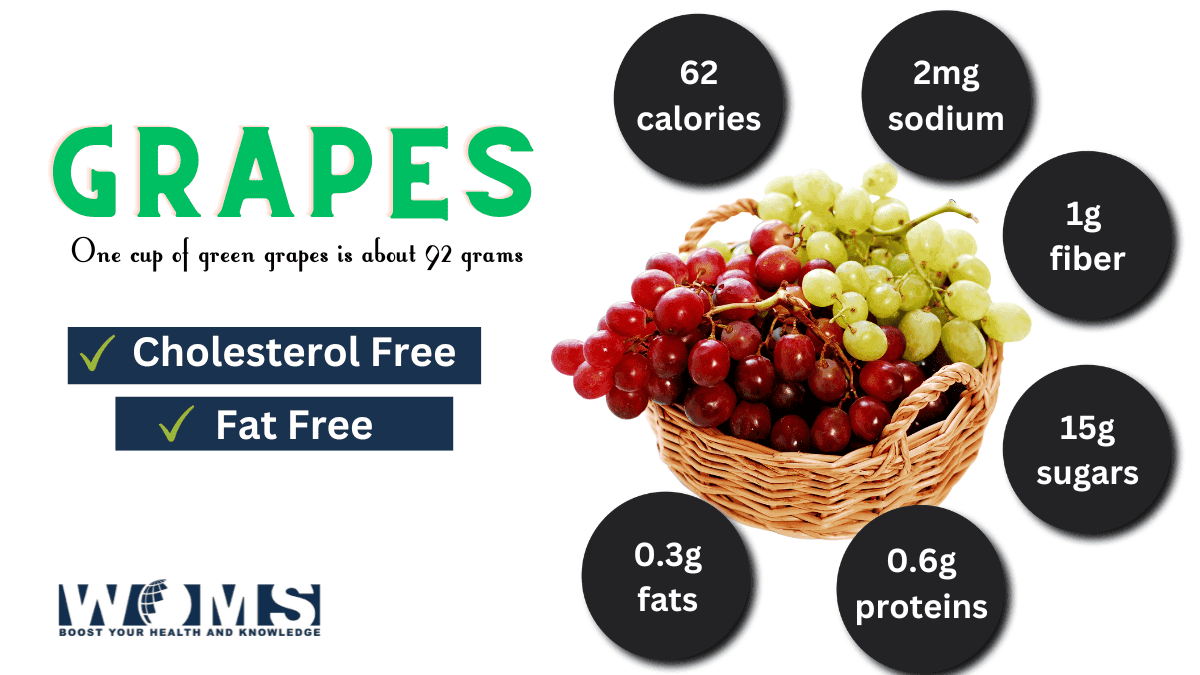Calories in grapes: Health benefits and adverse effects

Grapes are not only appealing to the eye but a sweet palatable treat for fitness freaks. It is also a critical ingredient in processing wine. Grapes are available in different sizes, colors, and shapes varying in taste from sweet to sour. How many calories in grapes is a serious question for people who are struggling with weight loss.
Grapes belong to the Vitis vinifera family, enriched with antioxidants. Antioxidants detoxify the body and provide a substantial barrier against multiple diseases. Fresh grapes are a good snack filled with vitamins K and C, and different phytonutrients. In this article, let’s know in details about the calories in grapes.
How many calories are in a cup of grapes?
One cup of green grapes is about 92 grams. A cup of grapes provides the following nutritional content.
- 62 calories
- 0.3g fats
- 2mg sodium
- 16g carbohydrates
- 1g fiber
- 15g sugars
- 0.6g proteins
- 3.68mg vitamin C
- 13.4mcg vitamin K
- 4.6mcg vitamin A
Here is complete detail about the main ingredients and calories in grapes.
Carbohydrates
A major portion of the calories is available in the form of carbohydrates. Carbohydrates are the form of sugar. Every grape counts about one gram of carbohydrate. The glycemic index for grapes is about 59. Whereas, the glycemic load for one cup of grapes is near to 11.
Proteins
Grapes provide about 1 gram of proteins for every serving. These can be paired with cheese or nuts to get a full protein load. With these snack items, it can be a balanced and healthy snack.
Fats
Grapes are almost fat-free snacks. They provide even less than 1 gram for every serving.
Vitamins and minerals
Green grapes are rich in minerals like manganese and vitamin K. You can also get a healthy portion of vitamin C to provide a booster effect for immunity. It also helps to repair tissues of the healing wounds.
Calorie count:
Calories represent the amount of energy drained by one cup serving of grapes. In regards of calories in grapes, Grapes provide 62 calories per every one-cup serving. Seedless red grapes provide 86 calories for every 100g. 100g is a bit more than a normal cup. In contrast to this, seedless green grapes provide 80 calories for every 100g.
What are the major health benefits of grapes?
Besides knowing the calories in grapes, let’s also look about the health benefits of grapes. Grapes are sweeter in taste with a low-calorie count. Grapes are a good substitute for snacks if you are trying to decrease your processed food intake. Grapes are a huge source of vitamins and minerals to provide benefits for your body. Here is a list of health benefits generated by the normal intake of grapes.
Reduces blood pressure
One larger cup of about 151 grams delivers 6% of the daily value for the potassium mineral. Potassium is a healthy mineral to lower blood pressure up to the optimum levels. Potassium dilates the arteries and veins primarily to reduce blood pressure. In addition, potassium increases the excretion of sodium from the body. Sodium causes the narrowing of the arteries and is the main culprit of increased blood pressure. For all these reasons, grapes are good for hypertensive patients to reduce their blood pressure.
Maintains heart health
Grapes are a good source of minerals like potassium and manganese. These minerals help a lot to maintain the optimum health of the heart. These minerals reduce blood pressure. Moreover, the antioxidants also help to offer a healthy state of heart.
Reduces cholesterol level
Red grapes are high in resveratrol antioxidants to reduce significant levels of blood cholesterol. In addition, there are multiple compounds in grapes that help to lower cholesterol levels by decreasing cholesterol absorption. A study of about 8 weeks suggests that eating 500 grams of red grapes for a day decreases total and LDL cholesterol levels. In contrast to this, white grapes are not known for such an effect.
Filled with antioxidants
Antioxidants are the components that are helpful to repair damaged tissues. Metabolic procedures release free radicals causing oxidative stress are the damaging molecules. Oxidative stress induces multiple chronic conditions like diabetes, cancer, and different heart problems. The skin and seeds of grapes are highly riched with antioxidants.
Grapes are available in different colors like red, pink, green, and purple. These grapes contain a good quantity of flavonoids that provide a specific tinge to these grapes. Flavonoids like anthocyanins are useful to treat heart and brain diseases. In addition, grapes are the source of vitamin C, lutein, beta carotene, and ellagic acid. These are also powerful forms of antioxidants.
Protection against diabetes
Grapes offer a lower glycemic index. The glycemic index explains how quickly it will raise your blood sugar levels. Eating a moderate level of grapes can help you to reduce your appetite for sugars. In addition, various components in sugars also improve markers of insulin resistance. This is an important fact to know along with the calories in grapes. Moreover, resveratrol improves the body’s ability to use insulin by
- Decreasing insulin resistance
- Increasing insulin sensitivity
- Protecting beta cells of the pancreas to produce insulin
- Boosts insulin production
- Increasing the count of glucose receptors on cell membranes
Decreases inflammatory responses
Inflammation is the body’s response to different pathogens. Chronic inflammatory cycles may lead to different debilitating diseases like cancer, arthritis, heart disease, and diabetes. The compounds like anthocyanin and resveratrol also offer significant anti-inflammatory properties. These compounds depress the stimulation of inflammatory markers like TNF-alpha and interleukin-6.
Boosts cognitive functions
Grapes are a rich source of resveratrol. It is a main ingredient to improve memory and cognitive functions in adults. Resveratrol is present in red grapes in more quantities.
Allergic reaction to grapes
Let’s also have a look at the allergic reactions besides knowing the calories in grapes. Some studies identified that grapes have the potential to induce allergic reactions in some people. There are some allergens present in grapes. The common symptoms of allergy include rash, hives, swelling, and some other serious reactions. If you have an allergic reaction to any fruit, there are probable chances to induce an allergy to grapes.
Adverse effects of grapes:
It is also essential to know the adverse effects of grapes now that you know about the calories in grapes. Grapes contain vitamin K in higher amounts. It can reduce the clotting process. Consult your healthcare physician if you take blood thinners like warfarin and monitor your vitamin K levels regularly. In addition, ingesting whole grains can cause choking hazards for kids. Cut grapes into pieces before serving your younger children.
Variants of grapes
Grapes are available in multiple varieties and thus the calories in grapes may also vary accordingly. These grapes can be black, white, green, ruby-red, or purple. Every variety of grapes provides a distinctive flavor to the taste buds. Seeded grapes are usually more enriched in flavor than seedless variants. Deep purple, red, and black grapes are enriched with antioxidants as compared to green grapes. Considering this, there is no such difference in the nutritional count.
Processed forms of grapes are usually higher in sugar and calories in grapes. Juices, jams, and jellies are made with increased sugar preparations. A 4 ounces grape juice serving contains 18 grams of sugar. This amount is higher than even a whole cup of fresh grapes. A tablespoon of grape jelly offers 10 grams of sugar.
When are grapes in the best form?
Now that you also know the calories in grapes along with benefits, you should also know when are grapes in the best form. Grapes are harvested throughout the summer and fall season. Besides this, you can always get imported grapes throughout the year. While purchasing grapes, go for fresh grapes without any mold. Choose grapes richer in color. Green grapes are sweeter and richly flavored. Red and black grapes are best when they have rich colors.
How to store grapes?
Grapes with powdery white coating are safe to eat. This coating is known as blood and a natural barrier for grapes against moisture loss and decay. It is safe to eat. If stored properly, grapes can last longer in the freezer for weeks. Storing grapes is an important thing besides knowing the calories in grapes. To maintain the freshness of the grapes, here are some steps to follow:
- Check for any sign of mold or poor stem attachment.
- Keep them cold.
- Keep grapes in the original packaging.
- Store them unwashed and wash them before you are using it.
- Freeze them to use in smoothies, cocktails, or as a cool snack item.
Conclusion
Grapes are a natural reservoir of carbohydrates, proteins, minerals, and vitamins. In addition, grapes maintain a lower glycemic index to regulate blood sugar levels. Moreover, grapes provide a lower calorie count per serving. It reduces the appetite and lowers the weight. Grapes provide a long list of benefits to be a good healthy snack. This article encircles all essential details regarding the grapes focusing on the calories in grapes. Give it a thorough read to get answers to your queries regarding grapes.
Frequently asked questions (FAQs)
Is grapes a good snack for weight loss?
A simple answer to this question is yes. Grapes are packed with high water content, insoluble fibers, and low calories. These features make grapes a good snack for weight loss when eaten in moderate quantities.
How many calories are present in 50 grams of black grapes?
A 50-gram serving of black grapes offers 37 calories. In contrast to black grapes, green grapes provide a bit lower calorie count of 33.
Is it ok if I use grapes at night?
Grapes are a natural source of melatonin. Melatonin is a good ingredient to regulate proper sleep cycles. So, for this, grapes are a good evening snack and may help you fall asleep.




